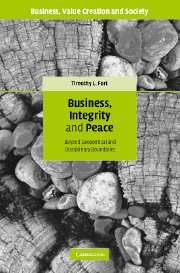Book contents
- Frontmatter
- Contents
- List of tables
- Foreword
- Special acknowledgment
- Acknowledgments
- Notes on citation style
- Part One Peace Through Commerce
- 1 The times and seasons of corporate responsibility
- 2 Red (and not so red) in tooth and claw
- 3 Tales of the firm
- 4 Honest Brokers
- Part Two Total Integrity Management
- Index
4 - Honest Brokers
Published online by Cambridge University Press: 19 January 2010
- Frontmatter
- Contents
- List of tables
- Foreword
- Special acknowledgment
- Acknowledgments
- Notes on citation style
- Part One Peace Through Commerce
- 1 The times and seasons of corporate responsibility
- 2 Red (and not so red) in tooth and claw
- 3 Tales of the firm
- 4 Honest Brokers
- Part Two Total Integrity Management
- Index
Summary
This chapter serves as a bridge between the idea that businesses can do something to contribute to sustainable peace and how companies can actually do this through an approach I call Total Integrity Management. Total Integrity Management is a way to blend the three value clusters of economizing, power-aggrandizing, and ecologizing into a coherent approach that builds business culture and which also happens to coincide with the three contributions business can make to sustainable peace. This chapter is largely the bridge that links Peace Through Commerce via Total Integrity Management by first proposing some metaphors that can be built upon.
The tone of this chapter changes. The previous two chapters have engaged in some abstract conceptual thinking about the history of business, politics, peace, anthropology, and theories of the firm. The basic conclusion is that we have three dimensions of our nature – power-aggrandizing, economizing, and ecologizing – and these play out in our social settings. Integrating them is a way to reach peace and stability. Our nature is such that we do have the capability of changing our social institutions. Those include our business institutions. Thus, the theories of the firm show ways firms have been thought of and how the Entity Theory both tends to historically emerge in business development, but also stands the best chance to make businesses into instruments of peace. That can be done through corporate culture, particularly in integrating three approaches to corporate responsibility: legal, managerial, and spiritual.
- Type
- Chapter
- Information
- Business, Integrity, and PeaceBeyond Geopolitical and Disciplinary Boundaries, pp. 116 - 128Publisher: Cambridge University PressPrint publication year: 2007

